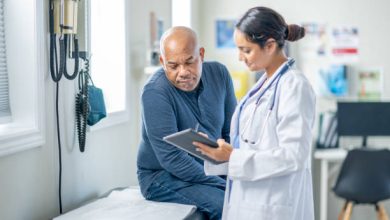Finding Your New Normal: A Day in the Life Post-Transplant


If you want your organ transplant to be successful, you’ll need to adjust to new ways of living that prioritize your health.
Importance Of Establishing Routines
If you want to be successful following a transplant, you need to establish consistent daily habits. Establishing regular habits can alleviate stress, ensure that you take your medications as prescribed, and keep you from neglecting your health. On top of that, they make it easier to monitor your health trends and spot any changes that could indicate an issue promptly.
Morning Routine
Medication Schedule
Consistently take your morning medication first thing in the morning. Use pill organizers and alarms and keep medications in a specific location. Always notify your transplant team if you need to make changes to your schedule or miss a dosage.
Temperature And Vital Sign Monitoring
You should take your vital signs, including your temperature, blood pressure, pulse, and weight, first thing in the morning every day. Keep a record of these particulars so that you can recognize patterns and problems before they become more serious.
Morning Hygiene Practices
As part of your rigorous hygiene routine, pay close attention to your oral hygiene, wash your hands frequently, and take a shower daily. To avoid irritating your gums, which immunosuppressants might do, try using an antimicrobial mouthwash and a gentle toothbrush.
Dietary Considerations
Safe Food Preparation
Thoroughly washing vegetables, avoiding raw or undercooked foods, and maintaining clean cooking surfaces are all essential components of a safe food diet. Raw meat and vegetables should be prepared on separate chopping boards.
Meal Timing With Medications
When making a meal plan, be sure to include all of your medications. Some medications must be taken with food, but others work better when taken without food. Plan their schedules so that they may work together effectively.
Hydration Requirements
In order to maintain proper hydration, you should consume two to three liters of water daily unless your team instructs you otherwise. Keep a water bottle on you at all times and track the amount of water you consume throughout the day.
Daily Activities
Energy Management
Pay attention to your body and maintain a steady pace. When you generally feel the most energized, which is often in the morning, schedule activities that need a lot of energy. Set aside time during the day to take breaks and relax.
Safe Social Interactions
While you are protecting yourself against illness, you should maintain your social relationships. Meetings should be held outside if possible, huge crowds should be avoided at first, and attendees should not be afraid to be questioned about their current state of health.
Work/Life Balance
You should gradually return to work after receiving approval from your medical team. Initially, you should think about working from home or having flexible hours. Relaxation and recuperation should take precedence over professional duties.
RELATED: Interested in Being an Organ Donor? Here’s What You Need to Know
Evening Wind-Down
Relaxation Techniques
Activities that reduce stress, such as mild stretching, meditation, or deep breathing exercises, should be included in your routine. Long-term stress may affect your immune system and the results of a transplant.
Sleep Hygiene
You should ensure a consistent sleep routine. It is recommended that you get between seven and nine hours of quality sleep, make your bedroom a relaxing environment, and avoid using electronic devices in the hours leading up to bedtime.
Preparation For Next Day
You should examine your schedule, arrange any necessary medical supplies, and set out the pills for the next day. Good preparation can help you maintain adherence to routines and reduce stress in the morning.
Special Considerations
Weather And Seasonal Changes
Protect yourself from really high temperatures. Immunosuppressants increase the chance of developing skin cancer, so it is important to use sun protection products throughout the year. When allergy season is at its height, it is best to avoid going outside.
Managing Visitors
Various clear limits should be imposed on guests, including the requirement that they practice proper hand hygiene, the restriction of the initial number of visitors, and the guarantee that sick visitors will not be permitted. There is no reason for you to feel guilty about delaying visits if it is necessary to do so.
Emergency Preparedness
An emergency pack that includes all of the materials listed below ought to be kept as close to hand as possible at all times:
- Additional pharmaceuticals
- A copy of the most recent compilation of medications
- Relevant medical contacts should be made
- The fundamental apparatus for monitoring vital signs
- A strategy for getting to the transplant center when it is needed
Tips For Maintaining Routine
- Print calendars or digital calendars on your smartphone might be utilized to keep track of your appointments and medications.
- On multiple instances, remind yourself of the crucial chores you need to complete.
- In the event that your schedule is unexpectedly altered, you should develop backup plans, keep a daily health record, and prepare medicine organizers on a weekly basis.
- It is important to involve members of the family in the process of setting up regular plans.
- The schedules should be placed in a location that is immediately noticeable.
When To Contact The Healthcare Team
Reach out immediately for:
- Fever over 100.4°F (38°C)
- Significant changes in vital signs
- Unexpected weight gain/loss
- New pain or swelling
- Changes in medication tolerance
- Unusual fatigue or weakness
- Signs of infection
- Emotional distress or anxiety
It is imperative that you never forget that your transplant team is your partner throughout this journey. They are happy to discuss any concerns, regardless of their magnitude. Regular communication with your transplant specialist is essential to getting the best possible outcomes for your transplanted organ and your overall health.
It may take you some time to establish your new normal, but if you are patient and maintain consistency, you will soon find that these routines come naturally to you. As you attempt to readjust to life after a transplant, it is important to focus on making progress rather than striving for perfection and to take pleasure in even the most insignificant of your achievements.




